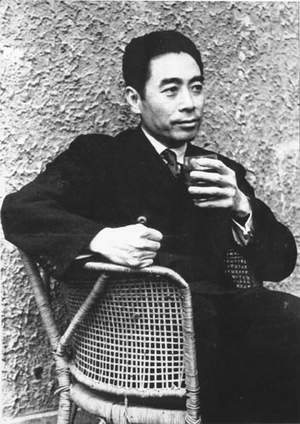ENLAI (uhn-LYE)
First
Premier of the People's Republic of China
Common clues: Zhou
____; Chou follower; Zhou of China; Big name in Chinese history;
Tse-tung supporter
Crossword
puzzle frequency:
3 times a year
Video: The
Story of Zhou Enlai
Nikita Khrushchev: The difference between the Soviet Union and China is that I rose to power from the peasant class, whereas you came from the privileged Mandarin class.
Zhou: True. But there is this similarity. Each of us is a traitor to his class.
Zhou Enlai (5 March 1898 – 8 January 1976) was the first Premier of the People's Republic of China, serving from October 1949 until his death in January 1976. Zhou was instrumental in the Communist Party's rise to power, and subsequently in the development of the Chinese economy and restructuring of Chinese society.

A skilled and able diplomat, Zhou served as the Chinese foreign minister from 1949 to 1958. Advocating peaceful coexistence with the West, he participated in the 1954 Geneva Conference and helped orchestrate Richard Nixon's 1972 visit to China. Due to his expertise, Zhou was largely able to survive the purges of high-level Chinese Communist Party officials during the Cultural Revolution. His attempts at mitigating the Red Guards' damage and his efforts to protect others from their wrath made him immensely popular in the Revolution's later stages.
As Mao Zedong's health began to decline in 1971 and 1972, Zhou and the Gang of Four struggled internally over leadership of China. Zhou's health was also failing, however, and he died eight months before Mao on 8 January 1976. The massive public outpouring of grief in Beijing turned to anger towards the Gang of Four, leading to the Tiananmen Incident. Although succeeded by Hua Guofeng, it was Deng Xiaoping, Zhou's ally, who was able to outmaneuver the Gang of Four politically and eventually take Mao's place as Paramount leader by 1977.
Zhou Enlai is regarded as a skilled negotiator, a master of policy implementation, a devoted revolutionary, and a pragmatic statesman with an unusual attentiveness to detail and nuance. He was also known for his tireless and dedicated work ethic, and his unusual charm and poise in public. He is reputedly the last Mandarin bureaucrat in the Confucian tradition. Zhou's political behaviour should be viewed in light of his political philosophy as well as his personality. To a large extent, Zhou epitomized the paradox inherent in a communist politician with traditional Chinese upbringing: at once conservative and radical, pragmatic and ideological, possessed by a belief in order and harmony as well as a faith, which he developed very gradually over time, in the progressive power of rebellion and revolution.
Though a firm believer in the Communist ideal on which the People's Republic was founded, Zhou is widely believed to have moderated the excesses of Mao's radical policies within the limits of his power. It has been assumed that he protected imperial and religious sites of cultural significance (such as the Potala Palace in Lhasa, Tibet) from the Tibetan Red Guards, and shielded many top-level leaders, including Deng Xiaoping, as well as many academics and artists from purges.
While debunking of Chinese leaders has become more common in recent years, Zhou Enlai, unlike Mao, retained a positive legacy among both Western and Chinese leaders. Henry Kissinger called Zhou "one of the two or three most impressive men" he had ever met, stating that "his commands of facts, in particular his knowledge of American events and, for that matter, of my own background, was stunning", despite Kissinger's dislike of the Communist ideology that Zhou represented.
However, dissidents have questioned the nature of Zhou's relationship with Mao, arguing that his moderation occasionally leaned towards complacency. Gao Wenqian, a Chinese biographer, describes a relationship between the two men as more complex than is commonly portrayed. He argues that while Zhou was not entirely docile, he did not do enough in protecting all of those he could have, at times giving in to Mao's whims rather than consistently mitigating them. Gao writes that Zhou was a survivalist, and avoided directly opposing Mao, a move that would have led to his political downfall. Deng Xiaoping may have overemphasized Zhou Enlai's achievements to distance the Communist Party away from Mao's disastrous Great Leap Forward and Cultural Revolution.
Zhou Enlai was known for his populist appeal, remaining popular even in the aftermath of the Cultural Revolution. Popular support for the Premier led to the Tiananmen Incident of 1976.
This article is licensed under the GNU Free Documentation License. It uses material from the Wikipedia article "Enlai".
|
|